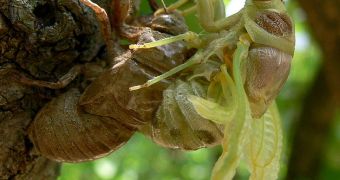Nature is a great source of inspiration for scientists worldwide. After inventing the tree-inspired solar arrays and the carbon-absorbing cement imitating coral reefs, experts though it is time to come up with a new sustainable material copying the resistance of insect cuticles to replace plastic in an efficient manner.
Harvard University’s Wyss Institute for Biologically Inspired Engineering have recently announced they are currently testing a new kind of material, called “Shrilk,” aiming to replace non-biodegradable plastic and the kind strongly depending on fossil-fuel usage.
It seems that “Shrilk,” was inspired by strong cuticles displayed by arthropods, Clean Technica informs.
Scientists say their finding would not only revolutionize the whole plastic industry and basically almost every product we could find in supermarkets. It could also be used in the medical sector, contributing to suturing wounds and other similar operations.
The best news is that the new insect-inspired product is expected to be biodegradable, therefore, much more eco-friendly than its traditional competitor and also cost-effective.
It is already known that the public is much more apprehensive to innovative green products that help them save money or at least don't require an increased investment.
“[Shrilk] has the potential to be both a solution to some of today’s most critical environmental problems and a stepping stone toward significant medical advances,” explained one of the researchers behind this project.
As we speak, the innovative material depends on fibroin proteins extracted from chitin and silk. Experts say both sustainable sources have a lot of potential and can be exploited properly in order to come up with a cheap product, since chitin can be obtained from shrimp shells.
The new material is like raw cooking dough in the hands of experimented scientists, since they have managed to make its level of stiffness vary, from rigid to very flexible.
Unfortunately, some discoveries are considered gold mines only in the labs of researchers, and appear to be unsuitable for a large-scale commercialization.
This appears to be the case of the soda plastic bottle made entirely of plants. If the new material proves its utilities outside the labs, it could definitely increase the sustainability of the plastic industry while triggering financial savings for consumers worldwide.

 14 DAY TRIAL //
14 DAY TRIAL //